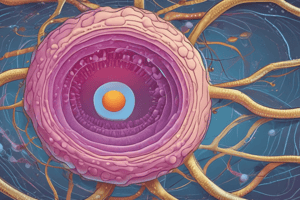Podcast
Questions and Answers
During what period after conception does the embryonic disk differentiate into 3 primary germ layers?
During what period after conception does the embryonic disk differentiate into 3 primary germ layers?
Which primary germ layer develops into the bones and teeth?
Which primary germ layer develops into the bones and teeth?
What is the approximate length of the embryo at the end of the embryonic stage?
What is the approximate length of the embryo at the end of the embryonic stage?
Why are developing areas with rapid cell division more vulnerable to malformation?
Why are developing areas with rapid cell division more vulnerable to malformation?
Signup and view all the answers
At the end of the embryonic stage, which of the following is true?
At the end of the embryonic stage, which of the following is true?
Signup and view all the answers
What is the primary function of the trophoblast in the blastocyst?
What is the primary function of the trophoblast in the blastocyst?
Signup and view all the answers
During what stage of development does the fluid-filled cavity appear?
During what stage of development does the fluid-filled cavity appear?
Signup and view all the answers
What is the result of the trophoblast's secretion of protease and protein digestive enzymes?
What is the result of the trophoblast's secretion of protease and protein digestive enzymes?
Signup and view all the answers
Where does the trophoblast typically attach itself to the uterus?
Where does the trophoblast typically attach itself to the uterus?
Signup and view all the answers
How many days after conception does implantation typically occur?
How many days after conception does implantation typically occur?
Signup and view all the answers
What is the term for the process by which the blastocyst binds to and buries within the uterine wall?
What is the term for the process by which the blastocyst binds to and buries within the uterine wall?
Signup and view all the answers
What is the primary function of hyaluronidase enzymes during fertilization?
What is the primary function of hyaluronidase enzymes during fertilization?
Signup and view all the answers
Where does fertilization typically take place in the female reproductive tract?
Where does fertilization typically take place in the female reproductive tract?
Signup and view all the answers
What is the result of the fusion of sperm and ovum nuclei during fertilization?
What is the result of the fusion of sperm and ovum nuclei during fertilization?
Signup and view all the answers
What is the term for the process of mitotic cellular replication that occurs after fertilization?
What is the term for the process of mitotic cellular replication that occurs after fertilization?
Signup and view all the answers
What is the structure that surrounds the morula, a solid ball of 16 cells?
What is the structure that surrounds the morula, a solid ball of 16 cells?
Signup and view all the answers
How often do cell divisions occur during the cleavage stage of fertilization?
How often do cell divisions occur during the cleavage stage of fertilization?
Signup and view all the answers
What is the primary component of the amniotic fluid volume?
What is the primary component of the amniotic fluid volume?
Signup and view all the answers
At what week does the fetus's Central nervous system begin to develop from the ectoderm?
At what week does the fetus's Central nervous system begin to develop from the ectoderm?
Signup and view all the answers
When do the kidneys of the fetus begin to function?
When do the kidneys of the fetus begin to function?
Signup and view all the answers
What is the main function of the gastrointestinal system in the fetus near term?
What is the main function of the gastrointestinal system in the fetus near term?
Signup and view all the answers
What is the approximate size of the fetal brain at term compared to an adult brain?
What is the approximate size of the fetal brain at term compared to an adult brain?
Signup and view all the answers
When do the distinguishing characteristics of sex differentiation appear in the embryo?
When do the distinguishing characteristics of sex differentiation appear in the embryo?
Signup and view all the answers
What is the purpose of the vernix caseosa in the fetal development?
What is the purpose of the vernix caseosa in the fetal development?
Signup and view all the answers
At what week of gestation does the fetus produce IgM immunoglobulins?
At what week of gestation does the fetus produce IgM immunoglobulins?
Signup and view all the answers
What is the role of fontanels in the fetal development?
What is the role of fontanels in the fetal development?
Signup and view all the answers
What is the significance of IgG immunoglobulins in the fetal development?
What is the significance of IgG immunoglobulins in the fetal development?
Signup and view all the answers
When do the toenails develop in the fetal development?
When do the toenails develop in the fetal development?
Signup and view all the answers
What is the significance of lanugo hair in the fetal development?
What is the significance of lanugo hair in the fetal development?
Signup and view all the answers
Study Notes
Germ Layer Differentiation and Development
- The embryonic disk differentiates into three primary germ layers during the third week after conception.
- The mesoderm germ layer develops into bones and teeth.
- At the end of the embryonic stage, the embryo measures approximately 3 centimeters in length.
Vulnerability During Development
- Areas with rapid cell division are more prone to malformations due to increased sensitivity to environmental factors and genetic influences.
Embryonic Stage Overview
- At the end of the embryonic stage, several critical structures and systems are significantly developed.
- The trophoblast in the blastocyst primarily functions to facilitate implantation into the uterine wall.
Developmental Milestones
- The fluid-filled cavity (blastocoel) appears during the blastocyst stage.
- The trophoblast's secretion of protease and protein digestive enzymes assists in digesting the uterine lining for proper implantation.
- Trophoblast typically attaches to the upper posterior part of the uterus.
- Implantation usually occurs approximately 6 to 10 days after conception.
- The process by which the blastocyst binds to and buries itself within the uterine wall is known as implantation.
Fertilization Processes
- The primary function of hyaluronidase enzymes during fertilization is to help the sperm penetrate the outer layers of the ovum.
- Fertilization typically takes place in the fallopian tubes of the female reproductive tract.
- The fusion of sperm and ovum nuclei during fertilization creates a single-cell zygote with a complete set of chromosomes.
- The term for the mitotic cellular replication process that occurs post-fertilization is cleavage.
- The structure surrounding the morula, a solid ball of 16 cells, is known as the zona pellucida.
Cleavage and Amniotic Fluid
- During the cleavage stage of fertilization, cell divisions occur approximately every 20-30 hours.
- The primary component of the amniotic fluid is water, contributing to the hydration and protection of the developing fetus.
Fetal Development Highlights
- The fetus's central nervous system begins to develop from the ectoderm by the end of the third week of gestation.
- Fetal kidneys begin to function around the 10th week of gestation.
- Near term, the primary function of the gastrointestinal system in the fetus is the processing of amniotic fluid and nutrient absorption.
- The fetal brain reaches about 25% of the adult size at term, demonstrating significant development.
Sex Differentiation and Developmental Accessories
- Distinguishing characteristics of sex differentiation appear in the embryo around 7-8 weeks of gestation.
- The vernix caseosa serves as a protective coating on the fetal skin, preventing damage and water loss.
- The fetus produces IgM immunoglobulins starting around the 20th week of gestation.
- Fontanels, or soft spots on a baby's skull, allow for flexibility during birth and brain growth during infancy.
- IgG immunoglobulins are significant for providing passive immunity to the fetus from the mother.
- Toenails begin to develop around the 18th week of gestation.
- Lanugo hair serves to help anchor the vernix caseosa to the skin and provides insulation for the fetus.
Studying That Suits You
Use AI to generate personalized quizzes and flashcards to suit your learning preferences.
Description
Test your understanding of the processes involved in sperm capacitation and fertilization, including the role of enzymes like hyaluronidase and the acrosomal reaction. Learn how sperm travel through the female reproductive tract and interact with the ovum.




